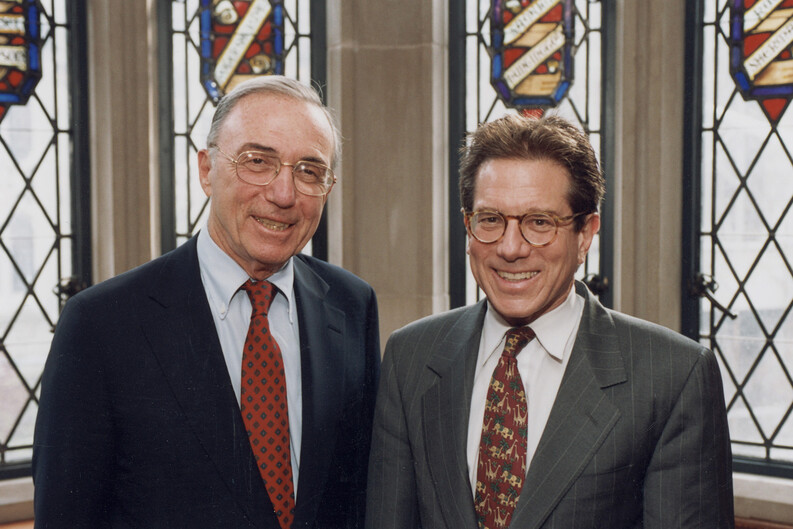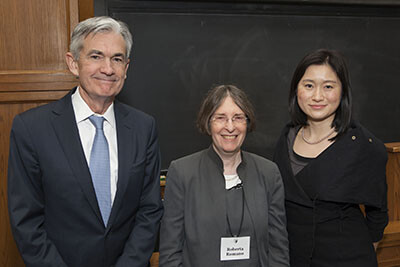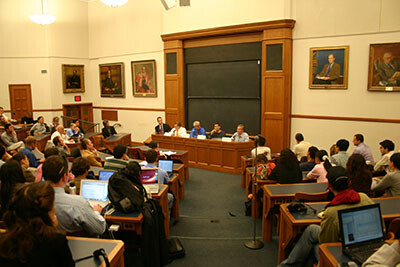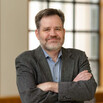A Jewel in the Law School’s Crown

Founded in 1999, the Center for the Study of Corporate Law was one of the first of its kind at any law school in the country. As the Center marks its 20th anniversary this year, it has cemented its place as a singular institution helping to bridge the gap between Law School faculty, students, and alumni practitioners.
More than two decades ago, Robert Todd Lang ’47 approached then-Dean Anthony Kronman ’75 about how best to support a range of activities within the study of corporate law. Lang, who passed away in 2018, was a senior partner at Weil, Gotshal, & Manges LLP and had been contemplating making a significant gift to the Law School for some time. Over the course of their conversations, he and Kronman became close personal friends.
“One topic that Todd and I came around to,” Kronman recalled, “was that even though the Yale Law School has produced and continues to produce corporate lawyers...that in the eyes of the world it often tends to be thought of as a place oriented more toward public law than private law.”

Federal Reserve Chairman Jerome Powell, Professor Roberta Romano ’80, and Nancy Liao ’05
The Law School has long been known as a place that produces senators, judges, and scholars. But Sterling Professor of Law Roberta Romano ’80 said the School has a “long and illustrious” tradition of producing leaders in corporate law, starting with Simeon Eben Baldwin, widely recognized as the leading railroad lawyer of his day in the 19th century. In the 20th century, scholars like Arthur Corbin (class of 1899) and other legal realists, including William O. Douglas, taught and wrote in the area of business law. The field’s interdisciplinary focus progressed to include the law and economics scholars of today.
Kronman and Lang’s ongoing conversations helped gel their thinking about what shape Lang’s contribution would take — eventually as the lead gift to establish a new corporate law center — with a director and varied programming. The Center for the Study of Corporate Law (CCL), which could be broad in scope and evolve over time to meet the needs of the School, was born.
“It never occurred to me that the inaugural director of the Center should be anyone other than Roberta Romano,” Kronman said. “She was my one and only candidate. I had no plan B.”
Today, nearly all leading law schools have a corporate law center, but at the time, CCL was unique to the Law School and quickly began to fulfill a need internally. Romano is proud of how the Center spurred other schools to approach the study of corporate law similarly.
“The creation of Yale’s corporate law center was a catalyst for other schools to establish their own corporate law centers,” Romano said at Lang’s memorial service last year. “As they say, imitation is the sincerest form of flattery.”
A RANGE OF ACTIVITIES
For Romano, the Center’s mission is to “improve the quality of discourse in the business law area at the Law School and in the world beyond the Sterling Law buildings and Baker Hall.”
While not an advocacy organization, Center programs underscore the idea that private law and the private sector (both profit and nonprofit) are engines of economic growth and therefore merit serious study.
The Center does not draw upon the School’s general revenues. “All of what we do is made possible by the generosity of Law School alums who believe in our mission,” Romano said.
Along with John R. Raben/Sullivan & Cromwell Executive Director Nancy Liao ’05, the work of the Center has grown to include a variety of activities under Romano’s leadership. “Nancy’s contribution to our success is critical. She makes me look good,” Romano said.
“In the last 20 years, Roberta has turned the Center into a model example for other schools of what the study of corporate law can look like.” — Dean Heather Gerken
A typical year of CCL programming includes two named lectures, as well as two speaker series, the Bert W. Wasserman Workshop in Law and Finance and the Marvin A. Chirelstein Colloquium on Contemporary Issues in Law and Business; the Weil, Gotshal & Manges Roundtable; alumni breakfasts in New York City; and as-sorted panels, lectures, symposia, and conferences totaling about 25 programs per year.
“The quality, quantity, and variety of programming that Roberta and Nancy are able to put on each year is remarkable,” said Dean Heather Gerken. “In the last 20 years, Roberta has turned the Center into a model example for other schools of what the study of corporate law can look like.”
The Center has also presented the annual Simeon E. Baldwin Award since 2007 to a Law School graduate or faculty member “for distinguished achievement in law and business.”
Fittingly, the inaugural Baldwin award was given to Lang, who also served as the Chairman of the Center’s Advisory Board from its inception until 2018. Baldwin was both a student and faculty member at the Law School and was responsible for the creation of the School’s interdisciplinary tradition, which would help propel the School into a preeminent institution.
Other recipients include the Hon. William Chandler ’79 LLM, then Chancellor of the Delaware Chancery Court; former Senior Vice President for Law and Public Affairs at General Electric Ben W. Heineman, Jr. ’71; Eugene A. Ludwig ’73, Chairman and Founder of Promontory Financial Group and former Comptroller of the Currency; and the Hon. Ralph K. Winter ’60, U.S. Court of Appeals for the Second Circuit and former Law School faculty member.
CONNECTING STUDENTS, ALUMNI, FACULTY
One of the aims of the Center is to facilitate connections between students, faculty, and alumni practitioners in ways that go beyond normal networking-style events. Through its programs, the Center brings prominent judges, regulators, and practitioners to the Law School, enabling faculty and students to stay current in one of the fastest moving areas of law.
“Roberta has done an unbelievable job filling out the Center and giving it life and presence within the school,” Kronman said. “Things started under Roberta’s watch that would have never occurred to me — the breakfast talks are a fantastic way of getting the Law School to New York on a regular basis for something that has real substance to it.”
The Craig Wasserman ’86/Wachtell, Lipton, Rosen & Katz Alumni Breakfasts comprise panel discussions on current topics in business law by members of the bar, business and investment communities, public officials and faculty. More substantive than a typical networking event or cocktail party, recent alumni breakfasts have centered on issues of cybersecurity, pharmaceutical research and development, and financial regulation. Key throughout is what Kronman calls a “bilateral synergy” that flows between faculty and alumni. In a rapidly moving scholarly field like corporate law, the breakfasts allow faculty to keep in touch with their practitioner graduates, and vice versa.
Not only valuable for current students, the alumni breakfasts put business law faculty directly in touch with “the very large number of supremely talented and highly experienced graduates who are practicing in the field,” according to Kronman.
Robert J. Giuffra ’87 sat on the Center’s advisory board for over a decade and recently became board chairman following Lang’s death. He echoed the need for close interaction among scholars and practitioners.
“Corporate law cannot be taught just by reading the latest court decisions or scholarly articles. It requires real-world knowledge of what’s happening in real time on Wall Street, at the Federal Reserve, in boardrooms, and in markets spanning the globe,” he said.
“Our graduates are working at the highest level of refinement and sophistication, and we have a tremendous amount to learn from them,” Kronman said.
This close contact with practitioners and scholars wasn’t always the case. Though faculty like Romano, George L. Priest, and Judge Ralph Winter taught classes in corporate law, Giuffra’s own student experience at the Law School prior to the existence of the Center lacked the interplay between students and practitioners that now defines the Center’s work. One could study corporate and securities law, but there was no nucleus of activity and scholarship.
“Back in the mid-1980s, the study of corporate law at Yale was less organized, and we had less direct contact with Wall Street, regulators, the boardroom and the markets than today’s faculty and students,” Giuffra said.
Sullivan & Cromwell LLP, where Giuffra is a partner, was an early supporter through the John R. Raben ’39 Fund, which sponsors a major public lecture by a leading expert in securities law or the accounting for business enterprises. Recent speakers have included Joel Mokyr, Niall Ferguson, and economist Richard Thaler, who went on to win the Nobel Prize in Economics.
At her admitted students weekend, Manning Ding ’20 said she remembered “being absolutely blown away by the thoughtfulness and innovation” with which Law School alumnus Vivek Ramaswamy ’13, CEO of Roivant Sciences, approached revolutionizing the pharmaceutical industry during a Chirelstein Colloquium event. Now a student, she believes that the activities of the Center foster important connections during and after law school.

A panel discussion held by the Corporate Law Center
“During their time at school, Law School students are able to meet and learn from some of the best practitioners in corporate law and business through CCL organized talks and conferences,” she said. “I’ve seen firsthand how Law School alumni who have connected via CCL benefit from these connections later on in their careers.”
Now Ding is copresident of the Yale Law and Business Society (YLBS), a student-led organization that connects students interested in corporate law, corporate social responsibility, and business through a range of academic and professional programming.
COMBINING SCHOLARSHIP AND PRACTICE
The Center fills a crucial need to impart the latest knowledge needed for a modern-day legal education through its tradition of bringing prominent practitioners to the School coupled with the School’s traditional strengths, according to Giuffra.
“Yale’s theoretical bent is great training for a corporate litigator,” he said. “My clients don’t come to me with the easy cases. Solving their problems requires thinking outside the box. I’m grateful to Yale, because I learned to be a creative lawyer, and the more novel the problem, the more I like it.”
John Morley ’06 began his relationship with the Center as a student and eventually returned to the Law School to be the John R. Raben/Sullivan & Cromwell Executive Director of CCL from 2007– 2010. While in law school, Morley’s initial attendance at conferences and events held by the center helped coalesce how he thought about scholarship and practice.
“I remember seeing a presentation at one of the center’s annual conferences in which an economist and a lawyer were each com- menting on a piece of scholarship about corporate governance,” Morley said. “I remember that the combination of the two perspectives was just fascinating.”
Today, Morley is Professor of Law at Yale Law School, focusing on the law and economics of organization. His student experience with the Center once included an event for students where Romano discussed the intellectual history of corporate law and how the study of corporate law had changed with developments in corporate practice.
“After that talk, I went to talk to Roberta in her office and she provided invaluable guidance for my career both in practice and academia. That’s really how my career got started,” Morley said.
Farrah Ricketts ’20 was first exposed to the work of the Center at the very beginning of her 1L year when she attended a lunch talk given by Liao on crafting a career in corporate law. “She not only provided my first exposure to concrete guidance on class selection generally, but she also offered specific advice on which black letter classes might indicate an interest in crafting an alternative career to a wide variety of employers,” Ricketts, who is YLBS copresident with Ding, said.
The annual Weil, Gotshal & Manges Roundtables are daylong events aimed at fostering a dialogue on today’s important business law issues. Leading legal practitioners, members of the business and investment communities, public officials, and scholars participate through presentations of scholarly papers and panel discussions.
Recent Roundtables have included a keynote address at a round-table on blockchain by then-Governor, now Chairman, of the Federal Reserve Board, Jerome Powell, and a conversation with Governor of Rhode Island Gina M. Raimondo ’98 and former Lieutenant Governor of New York Richard Ravitch ’58 on the gap in state and municipality obligations and revenues.
This year's annual Roundtable is scheduled for March 1. “We thought it would be fitting for the upcoming roundtable to focus on the theme ‘Ten Years after the Financial Crisis: An Assessment,’” Romano said. “Our distinguished participants will present papers and engage in a panel discussion on where we are today in the aftermath of the most severe financial crisis since the Great Depression.”
COLLABORATIONS
In order to “address opportunities and problems as we identify them,” according to Romano, the Center pursues new initiatives to enrich and expand the Law School educational experience beyond more conventional panels and lectures.
The Center was instrumental in establishing with the Yale School of Management one of the first three-year J.D.-M.B.A. programs available, and the first streamlined joint J.D.-Ph.D. in finance for students pursuing a career in business law teaching. The Center’s guidance further helped to “make sure that a rich offering of more specialized courses is provided by practitioners,” Romano said, and to create a new entrepreneurship clinic, which launched in 2018.
The activities of the Center helped foster the formation of YLBS, which continues to work closely with the Center. In addition to working with Law School faculty, YLBS helps connect law students with the faculty of the Yale School of Management, and both schools’ alumni.
Jackie Klaber ’12, who participated in the J.D.-M.B.A.program and is now managing director at Rockefeller Capital Management, was co-president of YLBS during her time at the Law School. She experienced the Center as a “central hub” for students interested in business law that both supplemented the academic curriculum and empowered students to make more informed career choices.
“As co-president of the Yale Law & Business Society, I could flag interesting topics for the Center and Professor Romano, and with their help the topic would become an event, a reading group, or even a course,” she said.
Those events, in turn, can be vital in providing students with valuable career guidance, according to Ricketts. “CCL and its specially curated events go a long way in providing students who may not have familial or other institutional support with critical information on how to create the careers of their choosing,” she said.
The Center’s twentieth anniversary is bittersweet for Romano without the presence of Lang, who she said was “a visionary in supporting the creation of the Center.” In the Center’s early days, they shared common concerns about legal education that could be lessened by bringing the academy and practice together.
As the Center enters its third decade, Giuffra called its existence “one of the biggest jewels in the Law School’s crown. Thanks to the Corporate Law Center, there are now lectures, roundtables, and symposia that enrich the study of corporate and securities law at Yale, for the benefit of the faculty, students, alumni and our society more broadly.”


